Einleitung
Um das Gehäuse auszutauschen, musst du alle Komponenten des Mini ausbauen.
Werkzeuge
Ersatzteile
-
-
Mit den Daumen in die Vertiefungen der Bodenplatte drücken.
-
Die Bodenplatte jetzt gegen den Uhrzeigersinn drehen, bis der weiße Punkt mit der Markierung auf dem Außengehäuse übereinstimmt.
-
-
-
Den Mini leicht kippen, damit sich die Bodenplatte vom Gehäuse löst.
-
Bodenplatte entfernen und beiseite legen.
-
-
-
Entferne die beiden 11,3 mm T6 Torx Schrauben, die den Lüfter auf der Platine nahe der Funkantenne festhalten.
-
-
-
Hebe die Öse des Lüfters, die dem RAM am nächsten liegt, von dem am äußeren Gehäuse befestigten Abstandshalter ab.
-
-
-
Nimm den Lüfter aus dem Mini heraus, sodass du ohne Probleme an die Anschlüsse kommst.
-
Fasse alle Lüfterkabel auf einmal und ziehe sie vorsichtig senkrecht nach oben, um den Lüfter vom Logic Board abzutrennen.
-
Entferne den Lüfter.
-
-
-
Entferne die einzige 3,5 mm T6 Torx Schraube, mit der die Haube am Kühlkörper befestigt ist.
-
-
-
Hebe die Haube an der Seite an die dem Antennenblech am nächsten liegt.
-
Drehe sie vom Gehäuse weg und ziehe sie ab.
-
-
-
Entferne folgende Schrauben, die das Antennenblech am Mini festhalten:
-
Zwei 6,6 mm T8 Torx Schrauben
-
Zwei 5,0 mm T8 Torx Schrauben oder 2,0 mm Sechskantschrauben (beide Schraubendreher funktionieren)
-
Beachte beim Zusammenbau:
-
-
-
Hebe das Antennenblech leicht von der Seite her an, die am nächsten am RAM liegt.
-
Ziehe das Blech vorsichtig von der kreisförmigen Rille des Gehäuses weg.
-
-
-
Mit der Spitze eines Spudgers löst du vorsichtig den Antennenverbinder aus seinem Sockel auf der AirPort/Bluetooth Platine.
-
-
-
Benutze das flache Ende eines Spudgers um den Verbindungsstecker der Festplatte aus seinem Sockel auf dem Logic Board zu lösen.
-
-
-
Löse den Verbindungsstecker des Infrarotsensors mit der Spitze eines Spudgers vom Logic Board.
-
-
-
Löse die folgenden drei Schrauben:
-
Eine 5,0 mm T8 oder 2,0 mm Sechskantschraube (beide Schraubendreher funktionieren)
-
Eine 16,2 mm T6 Tox Schraube
-
Eine 26 mm T6 Torx Abstandsschraube
-
-
-
Führe also das Mac Mini Logic Board Removal Tool in die beiden rot markierten Öffnungen ein. Achte darauf, dass es Kontakt zur oberen Seite des Außengehäuses unter dem Logic Board hat, bevor du weitermachst.
-
Ziehe das Tool vorsichtig in Richtung des I/O Boards. Das Logic Board und die ganze I/O Board Einheit sollte etwas aus dem Gehäuse rutschen.
-
Entferne das Mac Mini Logic Board Removing Tool.
-
-
-
Ziehe die ganze I/O Board/ Logic Board Einheit weit genug aus dem Gehäuse, um an die Stromversorgung zu kommen.
-
Löse mit den Fingern das DC-In Kabel vom Logic Board.
-
Ziehe den Stromkabelanschluss in Richtung der Vorderseite des Mini.
-
-
-
Ziehe vorsichtig die ganze Logic Board Einheit aus dem Mini, und passe dabei auf, dass kein Kabel hängen bleibt.
-
-
-
Entferne die 7,9 mm T6 Torx Schraube, die das Netzteil und den Festplattenrahmen am Gehäuse befestigt.
-
-
-
Ziehe die silbermetallische Halteklammer des Netzanschlusssockels von der Seite des Gehäuses weg und entferne sie vom Mini.
-
-
-
Lasse das Netzteil aus dem Mini gleiten, achte dabei darauf, dass keine Kabel hängen bleiben.
-
-
-
Entferne die 7,9 mm T6 Tox Schraube, die den Einsatz der Festplatte am Gehäuse befestigt.
-
Um dein Gerät wieder zusammenzusetzen, folge den Schritten in umgekehrter Reihenfolge.
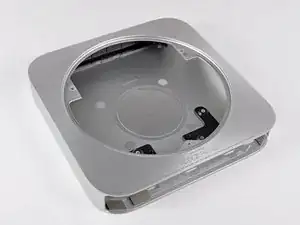
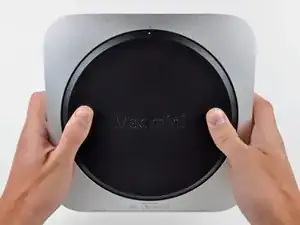
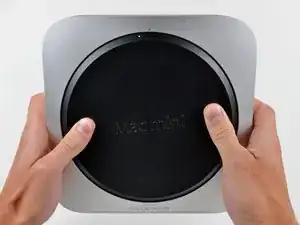

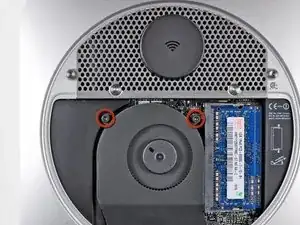
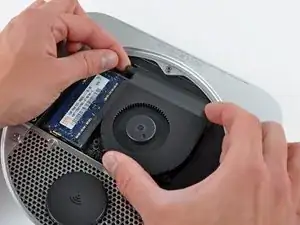
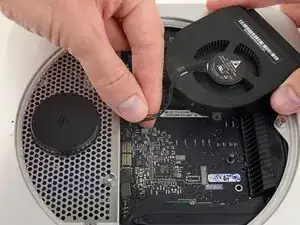
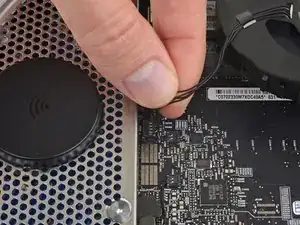
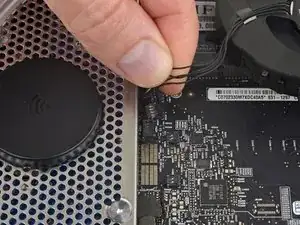
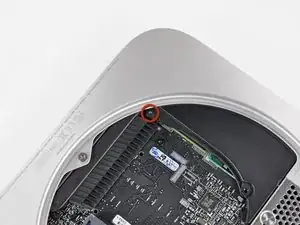
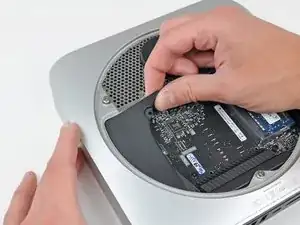
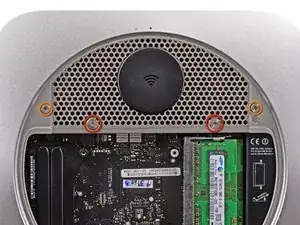
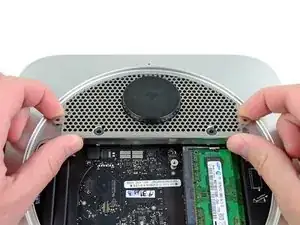
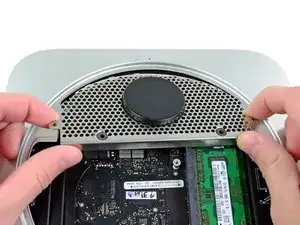
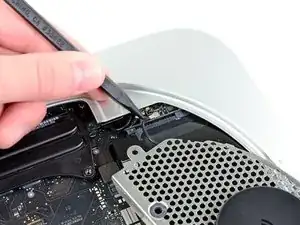
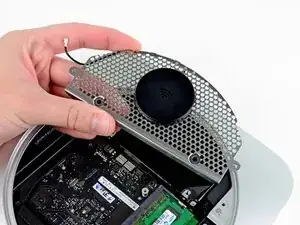
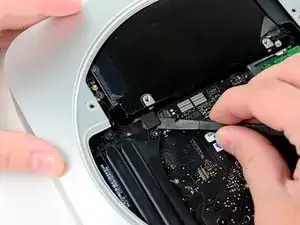
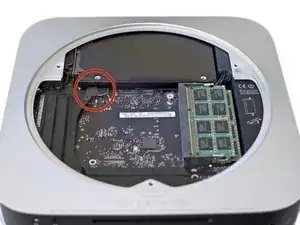
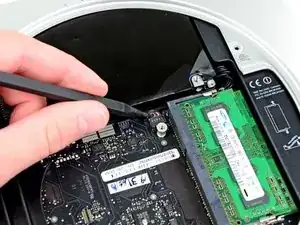
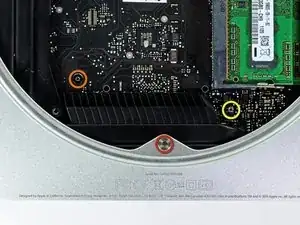
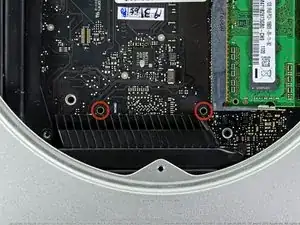
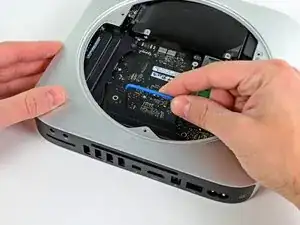
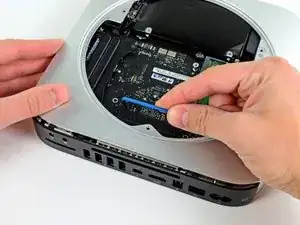
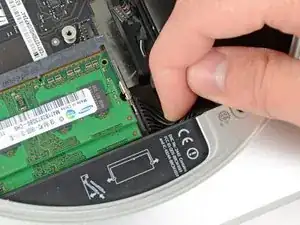
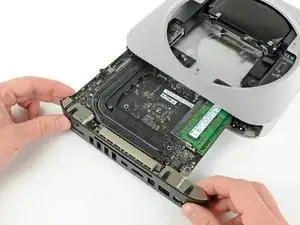
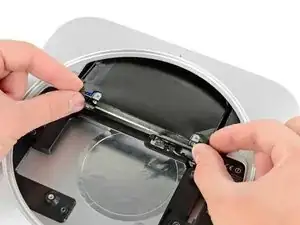
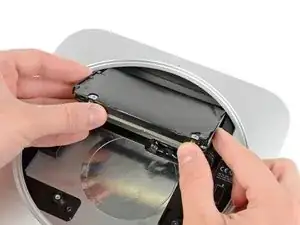
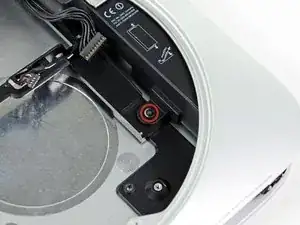
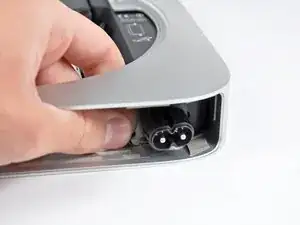
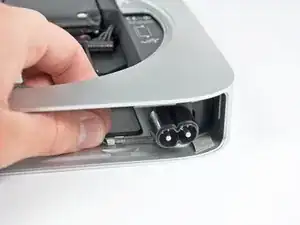
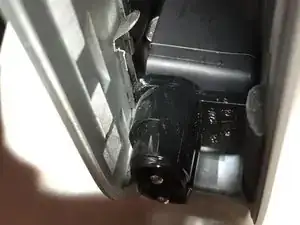
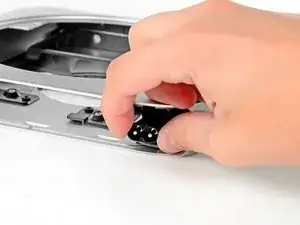
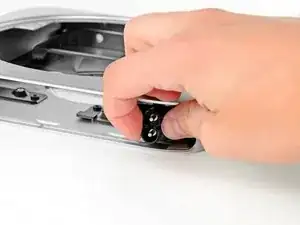
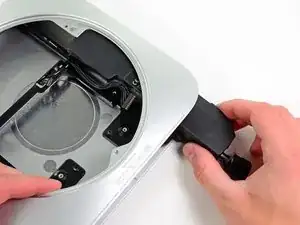
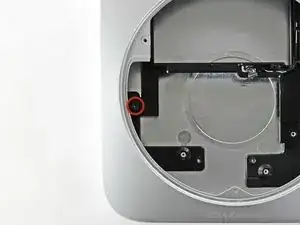
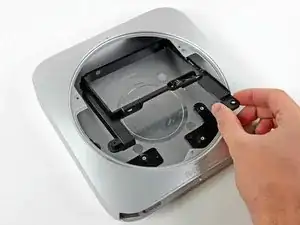

This took a lot of force on my Mac mini. A lot.
nh3 -
I agree. It took a crap ton of force from my thumbs to twist the bottom off.
sleeve -
I accidentally broke the little things that hold the cover to the case. Is there a cheap replacement to the cover? Those clips are held onto it very weakly.
Jacob Halton -
Don't just use your thumbs... Use your whole palm to twist it, with maybe a thumb in one of the recesses, applying slight downward pressure.
markbart -
Wish I would have read this comment before I did it!
I found that what markbart said works best. one palm one thumb (and my knees) My thumbs would do it. It was a bit at a time.
Same difficulty getting it back on.
Would be handy if this (difficulty) was mentioned in the guide
Also would be nice to mention the safe practice of pressing the power button for a few seconds after disconnected to rid the system of any residual power, working in a clean static free environment & they say on the crucial website to touch a metal surface of the machine before touching the RAM
Nancy -
I think it depends, I have seen some that are very difficult to open and some super easy. But I see them everyday. I wish there was a tool that fit in the holes.
Justin Weathersbee -
When seating the bottom RAM chip you may have to apply a little extra side force to get it to seat properly. I put in the new RAM and just got a beeping sound upon starting. I then put the old RAM back in and got the same result.
Here is the solution I found on the Apple discussion board.
"Take a small flat head screwdriver and after you put the memory in slot 0, put the screwdriver between the top of the mac mini and the memory then turn the screwdriver a little to exert pressure on the memory into the slot. Do it on both sides of the memory."
This worked for me.
littlemas2 -
I remember this when I was changing my memory ... I realized (after opening) that more you push, more force it take to open the cover. As you push down you force the cover "to rub" the casing and possibly other things inside. If you "lightly" hold the cover it comes right off ... Remember: less is more! :-)
Have fun!
Radek -
We found it hard to use the thumbs but if you put the casing on a carpet and one person is holding the case while the other is using his palm of one hand to turn the cover it comes off quite smoothly and without much downward pressure.
Alexander -
If you're upgrading to an SSD, before you even take this first step, I'd recommend putting the SSD into an external drive case, using USB and format the SSD first before trying to swap your existing hard drive or implementing a fusion drive. The external drive case will come in handy later so you can use the old drive as extra storage anyhow.
Once that SSD is internal, the Mac errors out during the formatting process. Once it was formatted externally, then installed inside the Mac again, there was no problem.
Orange Girl -
The first time I did this it hurt! The second time my mac mini 2012 had been running so was warm. VERY EASY WHEN WARM. No fun when cool!
Nancy -
Forget about those 2 circle indents. if you consider the 2 marked dots (open and close) as position 12 o’clock, place your thumbs at 11 and 1 o’clock on the outer rim of the cover and rotate from that position.
juicer52 -
No way was I getting the back off. So I made a tool. Took a large wrench longer than the Mac mini. Superglued 2 rubber feet on the wrench at the same location as the thumb indents. Put the Mac on the ground, between my knees and used my body weight to turn the cover. Worked like a charm.
Mark -